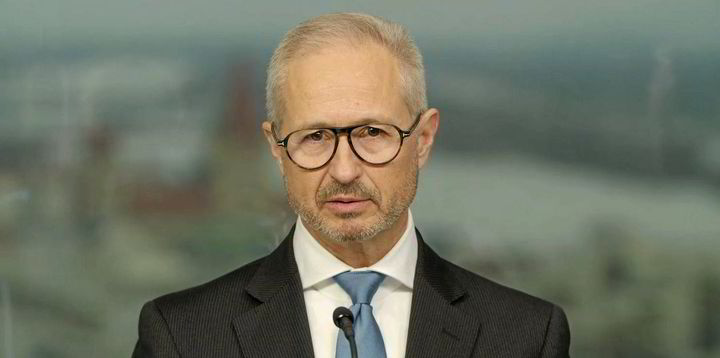Austria’s OMV has said it will continue buying Russian pipeline gas as long as shipments are made available at an agreed contractual delivery point under the company’s long-term purchase contract with Gazprom Export — and notwithstanding the heavy losses the company has incurred in Russia since the invasion of Ukraine.
Speaking in a conference call from Vienna on Thursday, OMV chief executive Alfred Stern said the company strictly adheres to the contractual “take-or-pay” clause, accepting Russian pipeline gas at a border point between Slovakia and Austria.
Stern said Russian gas supplies stabilised last year after fluctuating in 2022.
However, he said the company is fully prepared for a possible halt in Russian gas supplies in January 2025, with deliveries from alternative destinations secured despite Austria lack of a port to receive direct shipments of liquefied natural gas.
“OMV has indeed prepared for scenarios of an interruption of Russian gas supplies,” the company said in a statement provided to Upstream.
“OMV has continued to actively pursue the diversification of supply, sourcing natural gas from OMV’s own production in Norway and Austria, as well as from Norwegian natural gas producers. It has also contracted long-term LNG regasification capacities at the GATE terminal in Rotterdam,” the company said.
Article continues below the advert
“OMV also participates as a potential buyer in the auctions of the EU Joint Gas Purchasing Platform. In addition, OMV also has access to all major Central and North-West European natural gas trading and capacity marketplaces.”
Under the contract with Gazprom Export, Russian gas is delivered to OMV via a network of legacy pipelines running across Ukraine and Slovakia.
Governmental officials in Ukraine have repeatedly said they are not planning to enter into talks with Russia and Gazprom to negotiate a new transit agreement for Russian gas after the current five-year contract expires at the end of this year.
However, Slovakia has requested that Kyiv continue shipping Russian gas through its territory in 2025.
Slovakia Prime Minister Robert Fico earlier suggested that there had been a change in Ukraine’s stance, which Kyiv has vehemently denied.
“An agreement arose that the transit of Russian gas through Ukraine will probably continue, which is great news,” Fico said in a video message broadcast on social media after meeting with Ukrainian Prime Minister Denys Shmygal last week.
Moldova’s gas importer and distributor Moldovagaz likewise has suggested that Ukraine, as a signatory of the 1991 European Energy Charter, cannot refuse Russian gas transits to Moldova, which has also signed the treaty.
Gazprom had sent Russian pipeline gas through Ukraine at an average rate of more than 40 million cubic metres per day in 2023, with about 5 MMcmd of that volume being delivered to Moldova.
Speaking on Thursday, Stern suggested the possible switch away from Russian pipeline gas will take some time, as networks in Eastern Europe are upgraded to flow gas west to east, rather than the east-to-west direction of flow that the system operated under for decades.
Stern has also acknowledged that the company has yet to work out its response to the loss of its 25% share in a gas-producing venture with Gazprom that operated the South Russkoye gas and condensate field in West Siberia.
The company is still examining President Vladimir Putin’s December decree that transferred OMV’s shareholding to a Russian entity, and deciding on its next steps, Stern said.
The company firmly believes the decree amounts to “an expropriation” of its property but said it will not incur any new losses, having written down its Russian investment in 2022.

